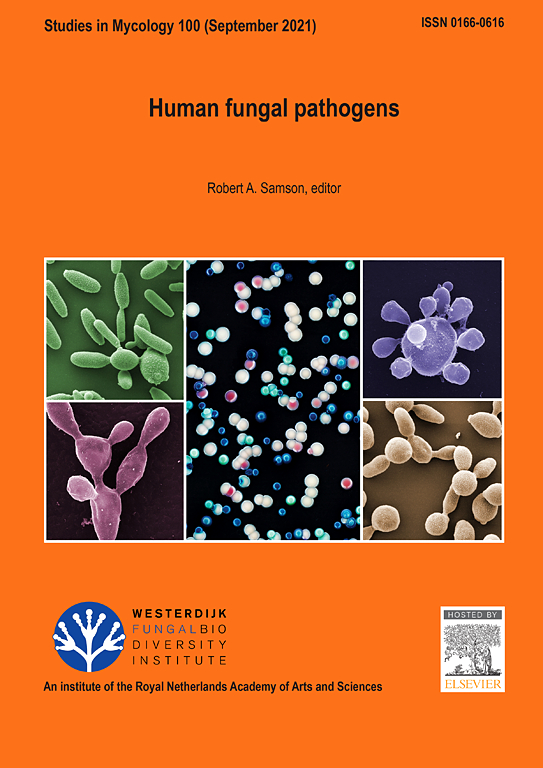来自世界两端的新毛霉菌。
摘要
Mucorales是一组分布于全球的古老真菌。在目前的研究中,我们接触了从地球两端和不同半球的两个国家分离出来的mucoralean真菌:韩国和巴西。从淡水、土壤、无脊椎动物和水果种子中分离得到Mucorales菌株,并利用表型技术结合DNA序列数据进行鉴定。这些分析揭示了15个新种,其中一个我们隶属于一个新提出的属,Neofennellomyces。这15个新种的建议名称为:青阳Absidia cheongyangensis、A. fluvii、A. kunryangriensis、A. paracylindrospora、A. tarda、A. variiprojecta、A. variispora、Backusella varians、Mucor albicolonia、M. aurantiacus、M. cryophilus、M. glutinatus、M. paraantomantidis、M. timomeni和neofenellomyces jeongsukae。在这些新种中,有12种是从韩国分离出来的:cheongyangensis、A. fluvii、A. kunryangriensis、A. paracylindrospora、B. varians、M. albicolonia、M. aurantiacus、M. cryophilus、M. glutinatus、M. paraorantomantidis、M. timomeni和N. jeongsukae; 3种是从巴西分离出来的:A. tarda、A. variiprojecta和A. variispora。讨论了这些真菌的生态位特异性,包括新记录的无脊椎宿主和Backusella, Circinella, Cunninghamella和Mucor种的新地理分布。鉴于这些发现,我们提供了Mucorales的清单。分类新异:新属:Neofennellomyces Hyang B. Lee & T.T.T. Nguyen。新种:Absidia cheongyangensis Hyang B. Lee & T.T.T. Nguyen, Absidia fluvii Hyang B. Lee, A.L. Santiago, P.M.Kirk, K. Voigt & T.T.T. Nguyen, kunryangriensis hyb . Lee & T.T.T. Nguyen, Absidia paracylindrospora hyb . Lee & T.T.T. Nguyen, Absidia tarda T.R.L. Cordeiro & A.L. Santiago, Absidia variiprojecta T.R.L. Cordeiro & A.L. Santiago, Absidia variispora T.R.L. Cordeiro & A.L. Santiago, Backusella varians hyb . Lee & T.T.T. Nguyen, aurantiacus hyb . Lee & T.T.T. Nguyen, Mucor cryophilus hyb . Lee & t.t.t.t. Nguyen,白毛霉香B. Lee & ttt . Nguyen,粘毛霉香B. Lee & ttt . Nguyen,副抗毛霉香B. Lee & ttt . Nguyen,霉霉香B. Lee & ttt . Nguyen, Neofennellomyces jeongsukae香B. Lee & ttt . Nguyen。引用本文:Nguyen TTT, de A. Santiago ALCM, Hallsworth JE, Cordeiro TRL, Voigt K, Kirk PM, Crous PW, Júnior MAM, Elsztein C, Lee HB(2024)。来自世界两端的新毛霉菌。真菌学研究109:273-321。doi: 10.3114 / sim.2024.109.04。The Mucorales is a group of ancient fungi with global distribution. In the current study we accessed mucoralean fungi isolated from two countries on opposite sides of the Earth and in different hemispheres: South Korea and Brazil. Mucorales isolates were obtained from freshwater, soil, invertebrates, and fruit seeds and identified using phenotypic techniques combined with the DNA sequence data. These analyses revealed 15 new species including one that we affiliated to a newly proposed genus, Neofennellomyces. Names proposed for these 15 new species are Absidia cheongyangensis, A. fluvii, A. kunryangriensis, A. paracylindrospora, A. tarda, A. variiprojecta, A. variispora, Backusella varians, Mucor albicolonia, M. aurantiacus, M. cryophilus, M. glutinatus, M. paraorantomantidis, M. timomeni, and Neofennellomyces jeongsukae. Of these new species, 12 were isolated from South Korea: A. cheongyangensis, A. fluvii, A. kunryangriensis, A. paracylindrospora, B. varians, M. albicolonia, M. aurantiacus, M. cryophilus, M. glutinatus, M. paraorantomantidis, M. timomeni, and N. jeongsukae, and three from Brazil: A. tarda, A. variiprojecta, and A. variispora. Niche specificity of these fungi is discussed including newly recorded invertebrate hosts and a new geographic distribution for species of Backusella, Circinella, Cunninghamella, and Mucor. Given these findings, we provide an inventory of Mucorales. Taxonomic novelties: New genus: Neofennellomyces Hyang B. Lee & T.T.T. Nguyen. New species: Absidia cheongyangensis Hyang B. Lee & T.T.T. Nguyen, Absidia fluvii Hyang B. Lee, A.L. Santiago, P.M. Kirk, K. Voigt & T.T.T. Nguyen, Absidia kunryangriensis Hyang B. Lee & T.T.T. Nguyen, Absidia paracylindrospora Hyang B. Lee & T.T.T. Nguyen, Absidia tarda T.R.L. Cordeiro, Hyang B. Lee & A.L. Santiago, Absidia variiprojecta T.R.L. Cordeiro & A.L. Santiago, Absidia variispora T.R.L. Cordeiro & A.L. Santiago, Backusella varians Hyang B. Lee & T.T.T. Nguyen, Mucor aurantiacus Hyang B. Lee & T.T.T. Nguyen, Mucor cryophilus Hyang B. Lee & T.T.T. Nguyen, Mucor albicolonia Hyang B. Lee & T.T.T. Nguyen, Mucor glutinatus Hyang B. Lee & T.T.T. Nguyen, Mucor paraorantomantidis Hyang B. Lee & T.T.T. Nguyen, Mucor timomeni Hyang B. Lee & T.T.T. Nguyen, Neofennellomyces jeongsukae Hyang B. Lee & T.T.T. Nguyen. Citation: Nguyen TTT, de A. Santiago ALCM, Hallsworth JE, Cordeiro TRL, Voigt K, Kirk PM, Crous PW, Júnior MAM, Elsztein C, Lee HB (2024). New Mucorales from opposite ends of the world. Studies in Mycology 109: 273-321. doi: 10.3114/sim.2024.109.04.

 求助内容:
求助内容: 应助结果提醒方式:
应助结果提醒方式:


